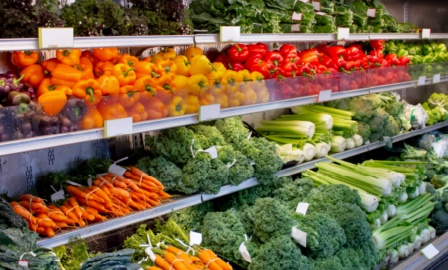Taking Fast-Moving Consumer Goods DTC
The COVID-19 pandemic played a significant role in accelerating the trend of fast-moving consumer goods (FMCG) companies introducing direct-to-consumer channels, a trend that has already been on the rise in the past few years. Though bigger brands have historically been better positioned in FMCG with financial advantages and retailer relationships, smaller DTC brands like Harry’s and Dollar Shave Club have proven to be disruptors in the FMCG market. As COVID-19 restrictions impacted operations for many FMCG companies, conditions have been perfect to test DTC channels as a new method to better connect with consumers. Overall, in 2020, the DTC market size had a 24.3% increase year over year, becoming valued at $17.5B, as 52% of DTC brands received significant demand increases. More consumers are becoming interested in DTC and willing to use DTC channels to purchase food and drink items, with eCommerce estimated to make up 10% to 12% of global FMCG sales by 2022, according to Nielsen. Now, online sales of edible, nonperishable or general food products take up 76% of online grocery subcategories, rising from 38%. Considering these figures, many companies have taken advantage of the opportunities presented by the pandemic to test out DTC channels.
PepsiCo’s PantryShop.com and Snacks.com initiative was one of the clearest examples of this pandemic-driven trend toward DTC, working through a 30-day sprint to create these websites and deliver an effective value proposition to customers. Online sales for Frito-Lay were 73% higher compared to 2019, with estimates that snack sales on their eCommerce channels will double by 2025. Heinz and Nestlé also implemented delivery offerings for consumers to order bulk items to their homes. Other businesses that have successfully utilized DTC channels include Gerber, Church & Dwight, Clorox, Hubble Contacts, Unilever, Clif Bar, and Mondelez, improving online search functions and product packaging to become more appealing and employing social media communications to gain consumer attention.
Why Take Fast Moving Consumer Goods DTC?
One of the biggest benefits for FMCG brands utilizing DTC channels is improving authentic customer relationships. By giving manufacturers ownership of consumer data, it is easier to improve their consumer engagement and build loyalty through better-informed marketing, product, and distribution decisions. Having access to first-party data provides insights to develop more data-driven operations, such as better targeted marketing efforts that meet consumers’ needs. Implementing a subscription model is another opportunity to increase customer loyalty and create value adds to revenue and forecasting predictability. DTC channels also allow FMCG brands to keep more control of the consumer experience and brand image. Access to first-party data provides more agility in product innovation, making it easier to meet customer expectations and improve customer segmentation.
Another benefit that DTC channels provide is cost savings. Supply chain diversification provides more control to manufacturers, which is especially important as prices are rising for many aspects of manufacturing and distribution. Though logistics costs may be higher, FMCG DTC can extend product penetration and take some reliance off of retailer decisions around pricing and promotion, providing cost benefits in the long run. Additionally, DTC channels give brands the opportunity to have more control over pricing to compete with other brands and/or retail prices.
With rising consumer expectations, there are many positive benefits of operating DTC channels as a competitive advantage. Implementation of DTC capabilities must be carried out carefully to maximize these benefits, as barriers to entry are relatively low and competitors may move quickly.
Learn More About our FMCG Consulting Practice
Implementing DTC Channels in Fast Moving Consumer Goods
FMCG companies planning to move into DTC have several considerations. The most daunting step for some brands may be the initial development of an eCommerce platform and related data analytics and storage platforms. Consumer data can be collected from sources such as websites, apps, social media, SEO, and more to develop a holistic view of the consumer, which can be used to develop consumer segments and gain feedback on customer experience and campaigns analyzed by channel. M&M’s worked to boost consumer engagement through social media campaigns which established a touchpoint that interested consumers in their DTC offerings and curated loyalty. Kellogg is another company that chose to invest in its analytics capabilities, reaping benefits from first-party data.
Key to this implementation is having the right team. For example, Frito-Lay placed 20 employees onto the DTC business development team at the start of their initiative, and the team has since grown to 30. Team members working on developing a DTC channel should be skilled in customer relationship management, eCommerce and data management platforms, and other digital marketing tools, as well as logistics. For manufacturers that are used to selling large quantities in small volumes to retailers, additional skillsets around planning, warehousing, accounting, and legal are often utilized. It can also be helpful for team members to have some understanding how traditional channels and retailers operate, with expertise on how DTC efforts will integrate or potentially conflict with these operations, perhaps adding a role to manage channel conflict to keep price in the right framework relative to retailers. Understanding the impact of all DTC marketing efforts is important to keep the manufacturer positively viewed by both retailers and consumers. Additionally, there are a few options for developing a DTC platform, whether building a website, acquiring a website, or investing in the growth of small brands, all of which have been utilized by Clorox. Putting together the right team to implement a DTC channel can make business more agile and support partners such as retailers, optimizing consumer experience and filling need gaps.
As retail is likely to continue to make up a large portion of FMCG sales even with the addition of DTC channels, it is important to prioritize relationships with retailers and distributors. DTC channels can benefit these relationships by providing a platform for testing and data that can improve sales for both the brand and the brick-and-mortar storefront, stepping up a FMCG manufacturer’s role to more than that of a supplier. DTC should be viewed as another channel that can be integrated for the benefit of the consumer journey.
Another element of taking fast moving consumer goods DTC that brands should consider is product sizing or unit of measure changes that will better suit delivery to an individual consumer. Additionally, shipping logistics will become significantly more important and likely more complicated, requiring brands to focus in this area in order to meet customer expectations. This makes smaller packaged products positioned to be especially successful with DTC, as these items are used and repurchased often and can be sized properly to make deliveries efficient.
As emerging digitally native brands continue to disrupt through DTC channels, there are still opportunities for FMCG manufacturers to identify a strategy that captures consumers seeking convenient online shopping options. By taking more control of consumer relationships with better access to data that can drive decision making and product innovation, consumers, partners, and manufacturers can benefit. As pandemic restrictions continue to loosen, it is also important for FMCG brands that have already started to make progress with DTC continue to leverage these channels to optimize their benefits. Clarkston can help your FMCG business move forward with DTC, whether you’re just getting started or in need of assistance along the way.
Learn More About Clarkston’s DTC Consulting Services
Subscribe to Clarkston's Insights
Coauthor and contributions by Courtney Loughran



